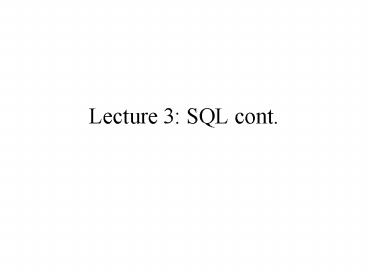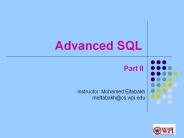Lecture 3: SQL cont. - PowerPoint PPT Presentation
1 / 36
Title:
Lecture 3: SQL cont.
Description:
Hint for reading the textbook: read the entire chapter 6 ! ... Gadgets $29.99. Powergizmo. GizmoWorks. Gadgets $19.99. Gizmo. Manufacturer. Category. Price. PName ... – PowerPoint PPT presentation
Number of Views:53
Avg rating:3.0/5.0
Title: Lecture 3: SQL cont.
1
Lecture 3 SQL cont.
2
Outline
- Unions, intersections, differences(6.2.5, 6.4.2)
- Subqueries (6.3)
- Aggregations (6.4.3 6.4.6)
Hint for reading the textbook read the entire
chapter 6 !
Recommended reading from SQL for Nerds chapter
4, Morecomplex queries (you will find it very
useful for subqueries)
3
First Unintuitive SQLism
SELECT DISTINCT R.A FROM R, S, T WHERE
R.AS.A OR R.AT.A
Looking for R ? (S ? T) But what happens if T
is empty?
4
Renaming Columns
Product
SELECT Pname AS prodName, Price AS
askPriceFROM ProductWHERE Price gt 100
Query withrenaming
5
Union, Intersection, Difference
(SELECT name FROM Person WHERE
CitySeattle) UNION (SELECT name FROM
Person, Purchase WHERE buyername AND
storeThe Bon)
Similarly, you can use INTERSECT and EXCEPT. You
must have the same attribute names (otherwise
rename).
6
(SELECT DISTINCT R.A FROM R) INTERSECT (
(SELECT S.A FROM S)
UNION (SELECT T.A
FROM T))
7
Conserving Duplicates
(SELECT name FROM Person WHERE
CitySeattle) UNION ALL (SELECT name
FROM Person, Purchase WHERE buyername
AND storeThe Bon)
8
Subqueries
- A subquery producing a single value
- In this case, the subquery returns one value.
- If it returns more, its a run-time error.
SELECT Purchase.product FROM Purchase WHERE
buyer (SELECT name
FROM Person WHERE
ssn 123456789)
9
- Can say the same thing without a subquery
- This is equivalent to the previous one when the
ssn is a keyand 123456789 exists in the
databaseotherwise they are different.
SELECT Purchase.productFROM Purchase,
PersonWHERE buyer name AND ssn 123456789
10
Subqueries Returning Relations
Find companies who manufacture products bought by
Joe Blow.
SELECT Company.name FROM Company,
Product WHERE Company.nameProduct.maker
AND Product.name IN
(SELECT Purchase.product
FROM Purchase
WHERE Purchase .buyer Joe Blow)
Here the subquery returns a set of values no
moreruntime errors.
11
Subqueries Returning Relations
Equivalent to
SELECT Company.name FROM Company,
Product, Purchase WHERE Company.name
Product.maker AND Product.name
Purchase.product AND
Purchase.buyer Joe Blow
Is this query equivalent to the previous one
? Beware of duplicates !
12
Removing Duplicates
SELECT Company.name FROM Company,
Product, Purchase WHERE Company.name
Product.maker AND Product.name
Purchase.product AND Purchase.buyer
Joe Blow
?Multiple copies
SELECT DISTINCT Company.name FROM Company,
Product, Purchase WHERE Company.name
Product.maker AND Product.name
Purchase.product AND Purchase.buyer
Joe Blow
? Single copies
13
Removing Duplicates
SELECT DISTINCT Company.name FROM Company,
Product WHERE Company.name Product.maker
AND Product.name IN
(SELECT Purchase.product
FROM Purchase
WHERE Purchase.buyer Joe Blow)
SELECT DISTINCT Company.name FROM Company,
Product, Purchase WHERE Company.name
Product.maker AND Product.name
Purchase.product AND
Purchase.buyer Joe Blow
Now they are equivalent
14
Subqueries Returning Relations
You can also use s gt ALL R
s gt ANY R
EXISTS R
Product ( pname, price, category, maker) Find
products that are more expensive than all those
produced By Gizmo-Works
SELECT name FROM Product WHERE price gt
ALL (SELECT price
FROM Purchase
WHERE makerGizmo-Works)
15
Question for Database Fansand their Friends
- Can we express this query as a single
SELECT-FROM-WHERE query, without subqueries ? - Hint show that all SFW queries are monotone
(figure out what this means). A query with ALL
is not monotone
16
Conditions on Tuples
SELECT DISTINCT Company.name FROM
Company, Product WHERE Company.name
Product.maker AND
(Product.name,price) IN
(SELECT Purchase.product, Purchase.price)
FROM Purchase
WHERE Purchase.buyer Joe Blow)
May not work in Mysql...
17
Correlated Queries
Movie (title, year, director, length)
Find movies whose title appears more than once.
correlation
SELECT DISTINCT title FROM Movie AS x WHERE
year ltgt ANY
(SELECT year FROM
Movie WHERE
title x.title)
Note (1) scope of variables (2) this can still be
expressed as single SFW
18
Complex Correlated Query
- Product ( pname, price, category, maker, year)
- Find products (and their manufacturers) that are
more expensive than all products made by the same
manufacturer before 1972 - Powerful, but much harder to optimize !
SELECT DISTINCT pname, maker FROM Product AS
x WHERE price gt ALL (SELECT price
FROM Product AS y
WHERE
x.maker y.maker AND y.year lt 1972)
19
Aggregation
SELECT Avg(price) FROM Product WHERE
makerToyota
SQL supports several aggregation operations
SUM, MIN, MAX, AVG, COUNT
20
Aggregation Count
SELECT Count() FROM Product WHERE year gt
1995
Except COUNT, all aggregations apply to a single
attribute
21
Aggregation Count
COUNT applies to duplicates, unless otherwise
stated SELECT Count(category) same as
Count() FROM Product WHERE year gt
1995 Better SELECT Count(DISTINCT
category) FROM Product WHERE year gt 1995
22
Simple Aggregation
Purchase(product, date, price, quantity) Example
1 find total sales for the entire
database SELECT Sum(price quantity) FROM
Purchase Example 1 find total sales of
bagels SELECT Sum(price quantity) FROM
Purchase WHERE product bagel
23
Simple Aggregations
Purchase
24
Grouping and Aggregation
Usually, we want aggregations on certain parts of
the relation. Purchase(product, date, price,
quantity) Example 2 find total sales after
10/1 per product.
SELECT product, Sum(pricequantity) AS
TotalSales FROM Purchase WHERE
date gt 10/1 GROUPBY product
Lets see what this means
25
Grouping and Aggregation
1. Compute the FROM and WHERE clauses. 2. Group
by the attributes in the GROUPBY 3. Select one
tuple for every group (and apply
aggregation) SELECT can have (1) grouped
attributes or (2) aggregates.
26
First compute the FROM-WHERE clauses (date gt
10/1) then GROUP BY product
27
Then, aggregate
SELECT product, Sum(pricequantity) AS
TotalSales FROM Purchase WHERE
date gt 10/1 GROUPBY product
28
GROUP BY v.s. Nested Queries
SELECT product, Sum(pricequantity) AS
TotalSales FROM Purchase WHERE
date gt 10/1 GROUP BY product
SELECT DISTINCT x.product, (SELECT
Sum(y.pricey.quantity)
FROM Purchase y
WHERE x.product y.product
AND y.date gt 10/1)
AS TotalSales FROM
Purchase x WHERE x.date gt 10/1
29
Another Example
For every product, what is the total sales and
max quantity sold?
SELECT product, Sum(price quantity) AS
SumSales
Max(quantity) AS MaxQuantity FROM
Purchase GROUP BY product
30
HAVING Clause
Same query, except that we consider only
products that had at least 100 buyers.
SELECT product, Sum(price quantity) FROM
Purchase WHERE date gt 9/1 GROUP
BY product HAVING Sum(quantity) gt 30
HAVING clause contains conditions on aggregates.
31
General form of Grouping and Aggregation
- SELECT S
- FROM R1,,Rn
- WHERE C1
- GROUP BY a1,,ak
- HAVING C2
- S may contain attributes a1,,ak and/or any
aggregates but NO OTHER ATTRIBUTES - C1 is any condition on the attributes in
R1,,Rn - C2 is any condition on aggregate expressions
Why ?
32
General form of Grouping and Aggregation
- SELECT S
- FROM R1,,Rn
- WHERE C1
- GROUP BY a1,,ak
- HAVING C2
- Evaluation steps
- Compute the FROM-WHERE part, obtain a table with
all attributes in R1,,Rn - Group by the attributes a1,,ak
- Compute the aggregates in C2 and keep only groups
satisfying C2 - Compute aggregates in S and return the result
33
Aggregation
- Author(login,name)
- Document(url, title)
- Wrote(login,url)
- Mentions(url,word)
34
- Find all authors who wrote at least 10 documents
- Attempt 1 with nested queries
This isSQL bya novice
SELECT DISTINCT Author.name FROM
Author WHERE count(SELECT Wrote.url
FROM Wrote
WHERE Author.loginWrote.login
) gt 10
35
- Find all authors who wrote at least 10 documents
- Attempt 2 SQL style (with GROUP BY)
This isSQL byan expert
SELECT Author.name FROM Author,
Wrote WHERE Author.loginWrote.login GROUP
BY Author.name HAVING count(wrote.url) gt 10
No need for DISTINCT automatically from GROUP BY
36
- Find all authors who have a vocabulary over 10000
words
SELECT Author.name FROM Author,
Wrote, Mentions WHERE Author.loginWrote.log
in AND Wrote.urlMentions.url GROUP BY
Author.name HAVING count(distinct
Mentions.word) gt 10000
Look carefully at the last two queries you
maybe tempted to write them as a nested
queries,but in SQL we write them best with GROUP
BY































